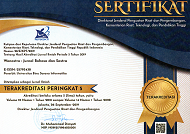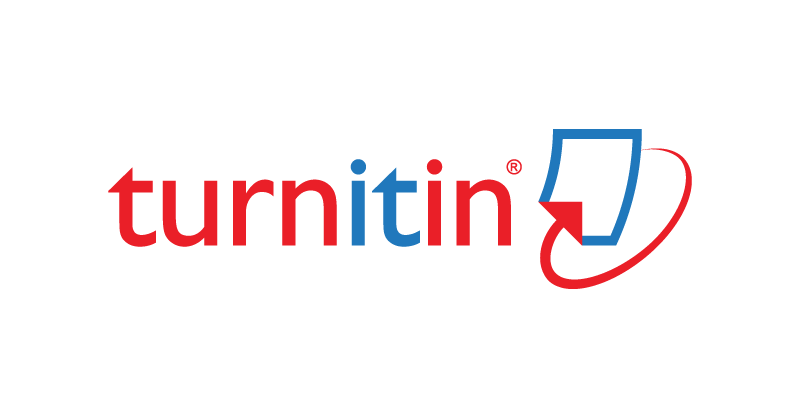The Correlation Between Vocabulary Mastery And Self Esteem On Students’ Speaking Skill
Abstract
Abstract - The purpose of this research was to find out whether there is a significant correlations between vocabulary mastery and self esteem on students’ speaking skill. The population of this study was X grade students majoring in natural science at SMU 64 Jakarta Timur, while the sample was 60 students were chosen randomly from those 3 classes. The writer used three instruments to gain the data : a vocabulary test, a speaking test, and a self esteem questionnaire. A quantitative analysis that included descriptive statistic and the correlation and regression analysis tests were conducted to answer the research hypotheses. The research results found that there is a significant simultaneous correlation between vocabulary mastery and self esteem on students’ speaking skill. This finding has proved the views which are vocabulary as a main language component and self esteem as affective factor have contributions in developing learning language especially fon speaking skill.
Key words : Vocabulary Mastery, Self Esteem, Speaking Skill
Full Text:
PDFReferences
REFERENCES
Aregu, Bekele Birhanie. (2013). Self-efficacy, self-esteem and gender as determinants of performance in speaking tasks : Journal of Media and Communication Studies Vol. 5(6), pp. 64-71. http://www.academicjournals.org/JMCS
Branden, Nathaniel. (1995). Six Pillar of Self Esteem. New York : Batam books.
Brown, H.Douglas.(2001).Teaching by principles :An interactive approach to language pedagogy. New York : Pearson Education Ltd.
Brown, H. Doughlas. (2000). Principles of Language Learning and Teaching. New York : Pearson Education.
Cameron, Lynn. (2001). Teaching language to young learners. UK : Cambridge University Press.
Coopersmith, S.(1967). The Antecendents of Self Esteem. San Francisco. CA.: W.H Freeman.
Fraenkel, Jack. R. & William Norman E Walen. (2007). How to Design and Evaluate Research in Education. Mc. Graw-Hill.
HeathertonT, F., & Polivy, J. (1991). Development and validation of a scale for measuring state self-esteem. Journal of Personality and Social Psychology, 60, 895–910.
Kalanzadeh, Gholam-Ali et al. (2013). The influence of EFL students’ self-esteem onTheir speaking skills. The International Journal of Language Learning and Applied Linguistics World (IJLLALW) Vol. 2 (2), February 2013. p. 76-83. Retrieved on March 1st, 2015 from www.languagelearningworld.org
Koizumi, Rie & Yo’Innami. (2013). Vocabulary Knowledge and Speaking Proficiency among Second Language Learners from Novice to Intermediate Levels. Journal of Language Teaching and Research, Vol. 4, No. 5, pp. 900-913. Finland : Academy Publisher Manufactured
Maleki,Niki, & M. Mohammadi A. M. (2009). Self-esteem and Anxiety of Iranian EFL Learners in Oral Communication Tasks. Journal of linguistic studies, 2 (2).p. 47-54.
Murk, Christopher J. (2006). Self esteem research, theory and practice. New York : Springer Publishing Company.
National Standards in Foreign Language Education Project. (2006). Standards for Foreign Language Learning in the 21st Century. United Stated : Allen Press.inc
Nation,I.S.P. (2001). Learning Vocabulary in another language. United Kingdom : Cambridge University Press.
Nunan, David. (1995). Language teaching methodology. Britain : Prentice Hill International.
Nunan, David. (1999). Second language teaching and learning. Boston : Heinle&Heinle Publisher.
Richard, Jack C. (2003). Methodology in language teaching. Cambridge University Press.
Rubio, Fernando. (2007). Self-Esteem and Foreign Language Learning. Newcastle : Cambridge Scholars Publishing
Stern H.H.. (1986). Fundamental concepts of leanguage teaching. Oxford : Oxford University Press.
Ujang,.Suparman, (2010). Psycholinguistic : The theory of Language Acquisition. Bandung :Arfino Raya Press.
DOI: https://doi.org/10.31294/w.v10i1.2998
Copyright (c) 2018 Nurmala Dewi, Jimmi Jimmi

This work is licensed under a Creative Commons Attribution-ShareAlike 4.0 International License.
Index by:
Published by Department of Research and Community Service (LPPM) Universitas Bina Sarana Informatika by supported Relawan Jurnal Indonesia
Jl. Kramat Raya No.98, Kwitang, Kec. Senen, Jakarta Pusat, DKI Jakarta 10450

This work is licensed under a Creative Commons Attribution-ShareAlike 4.0 International License






